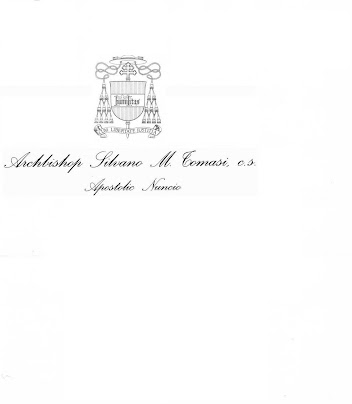ADDRESS BY H.E. MSGR. SILVANO M. TOMASI
Geneva
Monday, 10 December 2007
Mr. President,
First of all, the Delegation of the Holy See congratulates you and the High Commissioner of Human Rights and her Office on the important initiative to organize appropriate celebrations to mark the 60th anniversary of the Universal Declaration of Human Rights (UDHR).
On December 10th 1948, at the Palais de Chaillot in Paris, the United Nations General Assembly took an historical decision and adopted the UDHR.
The Universal Declaration remains the single most important reference point for cross-cultural discussion of human freedom and dignity in the world and represents the customary-law base for any discussion about Human Rights.
The rights presented in the UDHR are not conferred by States or other institutions but they are acknowledged as inherent to every person, independent of, and in many ways the result of all ethical, social, cultural and religious traditions. Human dignity goes beyond any difference and it unites all humans in one family; as such, it requires all political and social institutions to promote the integral development of any person, as an individual and in his or her relation with the community.
Human dignity concerns democracy and sovereignty, but goes at the same time beyond them. It calls upon all actors, both governmental and non-governmental, both faith and other communities, state and non-state actors to work for freedom, equality, social justice for all human beings, while respecting the world’s cultural and religious mosaic. The very fact that we share a common human dignity provides the indispensable base that sustains the inter-relatedness and indivisibility of human rights, social, civil and political, cultural and economic.
The integral development of the person finds its full and complete realisation in community life which, in turn, finds the root of its existence in the fundamental rights and the dignity with which each person is endowed.
The rights, recognized in the UDHR, are not subject to historical ups and downs or convenient interpretations, but find their balance and reference in the centrality of human dignity.
In this context, the important debate on the relation between freedom of speech and expression, on the one hand, and respect for religion and religious symbols on the other, finds a solution in human dignity. I can only increase my own dignity, that is to enjoy human rights to the full, when I respect the dignity of others. Freedom of religion for all, and education to implement such freedom, become the main road for respect of all beliefs and convictions.
In fact, human dignity is the basis for the implementation of all human rights and, at the same time, the point of reference to identify national interests, thus avoiding the "double danger" of extreme individualism and of collectivism. It is also normative in the adoption of measures in any field where the human person expresses himself, in work and economy, science and security, health and similar areas.
The Universal Declaration recognizes that the respect of all human rights is the source of peace. The concept of peace, as expressed in article 28, affirms that "Everyone is entitled to a social and international order in which the rights and freedoms set forth in this Declaration can be fully realized". Peace is not only conceived as an absence of violence but includes also cooperation and solidarity, at the local and international levels, as a necessary way in order to promote and to defend the common good of all people.
Sixty years after the Declaration many members of the human family are still far from the enjoyment of their rights and basic needs. Human security is still not ensured.
The occasion of the 60th Anniversary of the Declaration, launched today, can show that every person, as an individual or as a member of a community, has the right and the responsibility to defend and implement all human rights. An African aphorism puts it like this: "To be human is to affirm one’s humanity by recognizing the humanity of others, and on that basis, to establish humane relations with any person".
Thank you, Mr. President.
Stemma Episcopale

Questo e lo Stemma Episcopale del ArciVescovo Mons. Silvano Maria Tomasi, missionario Scalabriniano. Lo stemma ricorda il patrono della congeregazione Scalabriniana voluto dal Beato G.B. Scalabrini, San Carlo Borremeo nel suo stemma ce questa scritta Humilitas.
Iscriviti a:
Commenti sul post (Atom)

Nessun commento:
Posta un commento